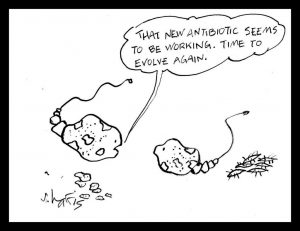Well…Well…WELL!!! I’ve got a very interesting item for you today…
Many many many thanks to my blog reader Charlotte for this gem: goo.gl/hMsWov
The link will lead you to a case report about a 86-year-old patient (with IgA lambda smoldering myeloma) who went into partial remission after taking roxithromycin, an antibiotic, for just ONE MONTH. This happened last year in New Zealand.
The patient’s paraprotein, which had been increasing since he was diagnosed in 2008, dropped from 46 g/L to 20 g/L.

That’s a 57% decrease! Wowsie.
And another thing: in addition to his other markers remaining stable (calcium and creatinine, e.g.) in the four months after taking roxithromycin, his hemoglobin increased to 132…from 97. Another wowsie.
I also discovered something else: the antibiotic clarithromycin has been found to have anti-myeloma activity BUT only in association with other drugs (dexamethasone, etc.). That’s the difference between the two antibiotics, since roxithromycin appears to have “significant single-agent anti-myeloma activity.” That is, it goes after myeloma all by itself…
I’m not a big fan of antibiotics, that’s for sure (although when you need ’em, you need ’em!!!), but this case report has certainly given me food for thought…
A lot of food for thought…
could be because chronic infections are known triggering agents for initiating SMM. Get rid of the infection (especially early enough in cancer formation), then get rid of SMM.
The macrolides have anti inflammatory/Pleiotropic effects/activity. So do the tetracyclines, minocycline and Doxycycline.
There a cancer centre in London which is using doxycycline and other old existing, low cost, well tolerated medicines to treat cancer-drugs in combination with chemotherapy . They seem to have good success.
They use a mix of drugs: statins, Metformin, Mebendazole (Vermox-a deworming tablet-cheap as chips) cimetidine, Itraconazole, Isotretinoin. They also do constant research.
Care Oncology Clinic in London.
http://careoncologyclinic.com/cancer-treatment-options/
And then there is this-The professor who ‘cured’ his cancer with a cocktail of everyday pills and 20 years on remains disease-free. Admittedly he had neuroblastome but this is usually a fatal cancer.
https://www.telegraph.co.uk/lifestyle/wellbeing/healthadvice/11424747/The-professor-who-cured-his-cancer-with-a-cocktail-of-everyday-pills-and-20-years-on-remains-disease-free.html
The good news is that early-stage laboratory experiments and clinical studies, as well as large scale epidemiological research point to the potential cancer-fighting properties of dozens of existing medicines that millions of people take safely every day for other ailments. Aspirin is the most high-profile example. Research funded in part by Cancer Research UK shows that it can significantly cut the risk of bowel, throat and stomach cancer if taken daily by people aged 50-65 (although the CRC warns on its website that aspirin can have side effects and should not be taken regularly without medical advice).
The Repurposing Drugs in Oncology (ReDo) Project, an international collaboration between the Anticancer Fund and US-based non-profit organisation Global Cures has identified 70 potential agents for which there is evidence of cancer-fighting properties. These include the diabetes tablet metformin, cholesterol-lowering statins, the antacid cimetidine, the de-worming tablet mebendazole, the anti-fungal itraconazole, and all the drugs Professor Williams took as he battled his brain tumour.
http://www.redo-project.org/
I agree with boxtrtle and I am taking doxcycline along with immunotherapy drug plus dex and. Cyc. does anyone know how to in cease albumin..I was,as low as 10 but have since increased go 13 after 3 mths treatment?
Banerjee, et. al., Ancient drug curcumin impedes 26S proteasome activity by direct inhibition of dual-specificity tyrosine-regulated kinase 2, Proc Natl Acad Sci U S A. 2018 Jul 9. pii: 201806797. doi: 10.1073
Curcumin, the active ingredient in Curcuma longa, has been in medicinal use since ancient times. However, the therapeutic targets and signaling cascades modulated by curcumin have been enigmatic despite extensive research. Here we identify dual-specificity tyrosine-regulated kinase 2 (DYRK2), a positive regulator of the 26S proteasome, as a direct target of curcumin. Curcumin occupies the ATP-binding pocket of DYRK2 in the cocrystal structure, and it potently and specifically inhibits DYRK2 over 139 other kinases tested in vitro. As a result, curcumin diminishes DYRK2-mediated 26S proteasome phosphorylation in cells, leading to reduced proteasome activity and impaired cell proliferation. Interestingly, curcumin synergizes with the therapeutic proteasome inhibitor carfilzomib to induce apoptosis in a variety of proteasome-addicted cancer cells, while this drug combination exhibits modest to no cytotoxicity to noncancerous cells. In a breast cancer xenograft model, curcumin treatment significantly reduces tumor burden in immunocompromised mice, showing a similar antitumor effect as CRISPR/Cas9-mediated DYRK2 depletion. These results reveal an unexpected role of curcumin in DYRK2-proteasome inhibition and provide a proof-of-concept that pharmacological manipulation of proteasome regulators may offer new opportunities for anticancer treatment.
http://www.pnas.org/content/early/2018/07/05/1806797115
Thanks Andrea. I will write more in couple of weeks. The albumin has gone up to 15, with above treatment, however the free light chain also rose 7 in two months. I had stopped curcumin for doxycycline..will continue taking it…